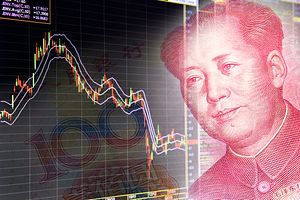The Chinese government is hard at work to bring an end to the volatility that has been plaguing the country’s stock market this week, sending shock-waves through global markets. After the Shanghai Stock Exchange fell by 8.49 percent on Monday, suffering its worse losses in 8 years, the country’s central bank sprung into action. The People’s Bank of China (PBOC), after letting the renminbi lose value against the U.S. dollar, has moved to cut benchmark interest rates and lowered reserve requirements, allowing Chinese banks to lend more. The PBOC has cut the one-year lending rate to 4.6 percent and the one-year deposit rate to 1.75 percent. The Chinese central bank’s move came after it allowed the renminbi to lose value against the dollar (I discussed that in greater detail here).
The short-term objective of these PBOC moves is to allow the Shanghai Stock Exchange to stabilize and to restore confidence in China’s economic resiliency. Unfortunately, these moves appear to fall far short of curing the disease afflicting the Chinese economy–they focus on treating symptoms instead. Indeed, as hundreds of commentators have noted, both since Monday’s crash and over the past two or so years preceding Monday’s crash, China’s economy is fundamentally off-kilter.
The Chinese economy’s rate of growth has slowed down–we first started observing signs of this earlier this summer. The lead-up to “Black Monday,” as even the Chinese media are calling it, was presaged by drops starting in mid-June. Fundamentally, the Chinese Communist Party’s attempt at dirigisme economics in shifting the country from a export-led growth model, which paid dividends over the years and boosted to China to economic superpower status, toward a demand-driven consumer economy cracked. For a moment, the ebullience with which the Chinese middle class embraced the country’s equity markets suggested that the Party had started to succeed, but Monday proved that all to be smoke-and-mirrors.
For Xi Jinping and company, this summer should serve as a much-needed reminder that whatever China’s technocratic leadership is doing, it isn’t working. Particularly, tinkering with monetary policy and credit regulation may patch things in the short-term (including thwarting capital flight from a devalued yuan), but it won’t get at tackling the fundamental problem that far too great a proportion of Chinese gross domestic product continues to be devoted toward investment. At the Communist Party’s most recent Third Plenum, in late 2013, it was apparent that China’s leaders had successfully diagnosed the problems facing the Chinese economy–they simply didn’t go far enough with structural reform at the time.
In this sense, this summer’s crash may finally allow China’s leadership to shed its obsession with posting certain GDP growth targets year-on-year and instead pursue the deep structural reform necessary to put Chinese households in the driver’s seat instead of state-owned enterprises. Unfortunately, looser credit and a weaker a yuan don’t even begin to move China toward reform. The PBOC’s moves could prove deleterious by concentrating additional credit and capital in state-owned enterprises, bypassing the country’s middle class altogether. Simply put, nothing the government has done in reaction to the current bout of financial malaise suggests that China is about to successfully balance its investment and consumption.
China is in trouble, and after this week, the world is witness to what may be the start of a new Chinese economic normal. The initial scramble of monetary policy and regulatory moves by the Chinese leadership is to help steer the country’s economy toward a less-hard landing than necessary (a soft landing isn’t on the cards anymore). After the dust settles, it’ll be long past due for Xi and the leadership to pursue serious structural reform.

































